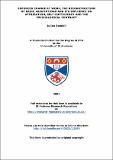Enforced change at work, the reconstruction of basic assumptions and its influence on attribution, self-sufficiency and the psychological contract
Abstract
The theoretical underpinning of Human Resource Management assumes the existence of individual motivation, which can be manipulated or managed in a way that enables organisational objectives to be achieved with the compliance and commitment of the individual worker. However, the increasing incidence of mergers, takeovers and reengineering has imposed on the individuals caught up in it change and challenge, which leaves even those retaining their employment doubtful of the benefits of HRM proclaimed by employers. Job insecurity has been well researched by those who wish to examine how enforced change affects the survivors both within the organisation and those who move on to alternative employment elsewhere. Charting the change undergone by individuals suffering such enforced change at work has traditionally involved attempts to measure the antecedents of change and correlating it to the consequences of the change. In this way the effects of imposed change on individuals can be linked to organisational consequences like intention to leave or job satisfaction. The present research allows individuals to reflect on their own confirmed and disconfirmed expectancies following the experience of enforced change at work. It allows them to examine what assumptions they had about their employer's behaviour during enforced change and how far they have accepted or rejected the legitimacy of that behaviour. For each of them this has involved interpreting events occurring during enforced change. Such interpretation may reinforce the meaning of work and its inherent value or threaten continued belief in the value of employers' promises of employment and career development. Identifying expectancies enables the researcher to examine the different responses to questions of attribution, self-sufficiency and the traditional elements of loyalty and trust together with the individual's assessment of how he or she would respond to a repeat of such enforced change. The conclusions of the present research indicate that individuals who maintain traditional beliefs of loyalty and trust are more likely to experience alienation than those who evince an independence who seek to use working experience to gain more knowledge and skill and so increase their own employability. The future dependence of employers on traditional promises of career development and life long learning would seem to have been circumscribed by the many individuals whose experience of enforced change has convinced them they need to take ownership of their own destiny in which different employers will play but a fleeting part.
Type
Thesis, PhD Doctor of Philosophy
Collections
Items in the St Andrews Research Repository are protected by copyright, with all rights reserved, unless otherwise indicated.

